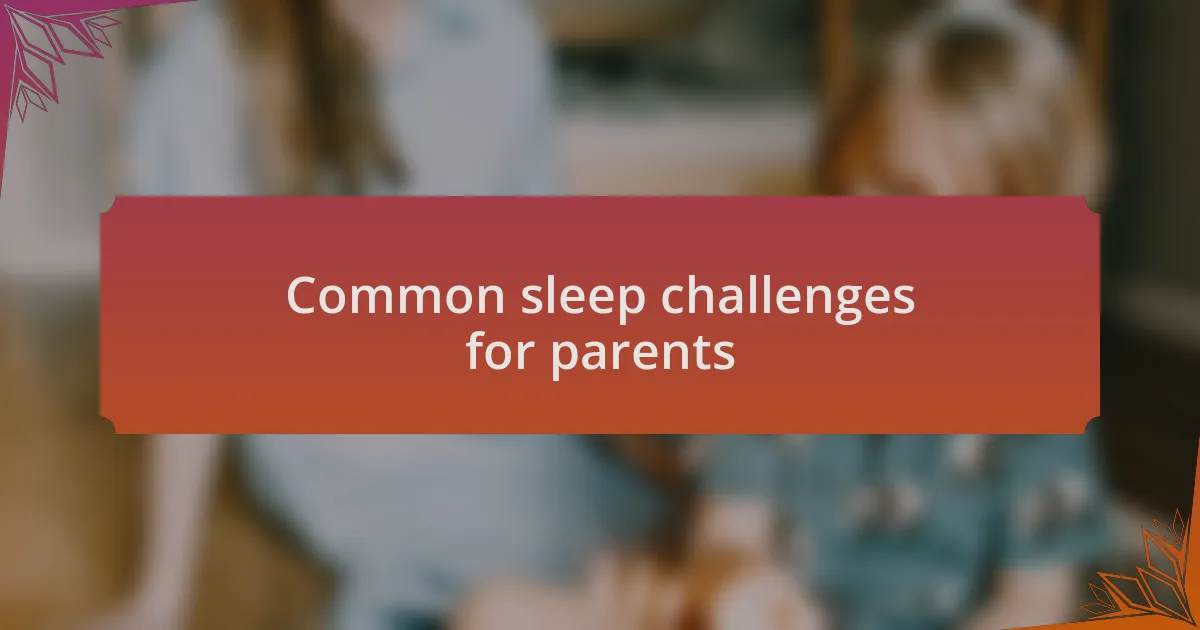Key takeaways:
- Sleep quality is determined by both the quantity of sleep and the consistency of sleep patterns, along with mental well-being and environment.
- Parents often sacrifice sleep for family demands, which can lead to irritability and decreased emotional balance.
- Establishing a calming bedtime routine and minimizing screen time significantly enhances sleep quality for both parents and children.
- Creating a peaceful sleep environment and practicing mindfulness can improve overall sleep experiences and well-being.

Understanding sleep quality
Sleep quality goes beyond just the number of hours we spend in bed; it encompasses how restful and restorative that sleep is. I remember a time when I would wake up after eight hours of sleep but still feel exhausted. It turns out the way I was sleeping—tossing and turning, often interrupted—left me feeling drained instead of refreshed.
Understanding sleep quality means recognizing the different stages of sleep, like REM and deep sleep, which are crucial for physical and mental rejuvenation. Have you ever noticed how some nights you wake up feeling like a superstar while others make you feel barely functional? I’ve learned that a solid night’s sleep often involves not just quantity but also consistency in sleep patterns, along with creating a peaceful sleep environment.
Emotional well-being is intricately tied to sleep quality. I’ve had evenings where my mind raced with worries, and the fatigue the next day was almost palpable. It’s interesting how our daily stresses can affect our sleep, isn’t it? The interplay between our mental state and sleep quality is a dynamic I’ve come to respect deeply.

Importance of sleep for parents
When it comes to parenting, sleep is often the first thing we sacrifice. I can recall countless nights when I stayed up late just to get a few moments of peace, only to wake up the next day feeling irritable and overwhelmed. It’s a cycle that many parents find themselves in, where the need for rest is overshadowed by the endless demands of family life. Do you ever feel like you’re running on empty? It’s no surprise that sleep deprivation can hinder our ability to engage with our children fully.
Quality sleep is vital for parents to maintain their emotional balance. From my experience, lack of sleep can lead to increased stress and frustration, making little challenges feel monumental. Have you ever snapped at your kids over something trivial? I’ve been there, and it’s often a clear sign of sleep deprivation. Being well-rested helps us respond with patience and love, rather than fatigue-fueled frustration.
Moreover, sleep directly impacts our health and effectiveness as caregivers. I’ve noticed that when I prioritize my sleep, I have more energy for family activities and can enjoy those moments without feeling drained. Isn’t it ironic that something so basic can be our best ally in parenting? The truth is, when we nurture our sleep, we are also nurturing our ability to be present and engaged with our little ones.

Common sleep challenges for parents
Navigating sleep challenges as a parent can often feel like a daunting task. There were nights when my baby would wake every hour, and my heart would sink each time I heard that soft cry. I often wondered, “Will I ever get a full night’s sleep again?” The unpredictability of a child’s sleep patterns definitely adds significant stress to a parent’s life.
Then there’s the age-old struggle of bedtime routines. Establishing a consistent routine for kids can be a never-ending battle of wills. I remember desperately trying to negotiate with my toddler, often yielding to another bedtime story, which I knew would just push my own sleep time back. It’s a tough balance between wanting to cuddle and the need for rest—have you felt that tug-of-war too?
And don’t forget about the impact of our own busy minds when we finally hit the pillow. I still find myself lying awake, replaying the day’s events or stressing about tomorrow’s tasks. It can feel isolating, can’t it? In those moments, I’ve learned that mindfulness practices, like deep breathing, can be a game-changer, helping me let go of the day’s chaos so I can finally find some peace and drift off to sleep.

Strategies for improving sleep
One effective strategy I’ve found for improving sleep is to create a calming sleep environment. Dimming the lights and setting a comfortable temperature can work wonders. I recall one night, after my son finally fell asleep, I lit a lavender-scented candle in the dimmed living room. It transformed the space into a cozy haven, helping me unwind and signaling my brain that it was time to rest too. Have you ever tried adjusting your surroundings to enhance your sleep?
Establishing a consistent bedtime routine has also been essential for both my child and me. Similar to how I read my child a story each night, I’ve started incorporating my own wind-down ritual with a warm herbal tea and a bit of reading. It makes a significant difference in how I feel heading into the night. There’s something reassuring about this predictability—doesn’t it just make you feel more settled as you prepare to sleep?
Lastly, I’ve learned the power of limiting screen time before bed. As difficult as it is to put my phone down, especially when I find myself scrolling through social media, I can feel the difference when I resist that temptation. Instantly, my mind quiets as I step away from the digital noise. Have you noticed how screens often stimulate rather than relax? By giving myself that break, I’ve found my sleep quality improves remarkably.

Creating a bedtime routine
Creating a bedtime routine isn’t just beneficial for children—it’s been a game changer for me as well. I remember when my daughter was younger, she’d struggle with transitions at night. So, I started introducing a series of calming activities like a warm bath followed by gentle music. Seeing her relax indeed brought about a sense of peace that helped us both. Have you ever felt the relief that comes with a predictable rhythm at night?
I’ve discovered that the specific activities we choose can have a profound impact. For instance, I began including relaxation techniques, like deep breathing, right before we read her bedtime story. Not only does this help her wind down, but it also prepares my mind for rest by shifting my focus away from the day’s chaos. Reflecting on this, I often wonder how many families overlook the power of such simple rituals.
Every so often, I tweak our routine to keep it fresh and engaging. I recall experimenting with nighttime gratitude, where we’d share one positive thing that happened during the day. It deepened our connection and created a blissful atmosphere, allowing us to go to sleep feeling happy and fulfilled. Isn’t it fascinating how small changes can elevate our bedtime experience?

Personal journey to better sleep
Establishing a bedtime routine has not only transformed my daughter’s nights but my own as well. I vividly recall those nights when I would lay awake, my mind racing with worries about the day’s challenges. It was during one particularly restless week that I realized I needed to take control. By committing to turning off all screens an hour before bed, I created a peaceful atmosphere that allowed both of us to disconnect from the world and reconnect within ourselves. Have you ever noticed how silence can be a soothing balm at day’s end?
One pivotal moment in my journey to better sleep occurred when I started incorporating mindfulness into our routine. I remember lying beside my daughter as we practiced simple visualizations—imagining tranquil places like beaches or forests. This not only helped her settle down but also made me reflect on my own mental landscape. It felt as though I were slowly unraveling the tight knots of tension built up throughout the day. Isn’t it remarkable how such a small shift in focus can transform your entire night?
I also became more aware of the importance of my sleep environment. One evening, after a long day, I made the spontaneous decision to declutter our bedroom. I was shocked at how invigorating it felt to create a serene space free of distractions. The very act of simplifying that space made a noticeable difference in the quality of our sleep—who would have thought that a tidy room could lead to a more restorative night?

Tips for sustainable sleep habits
Creating sustainable sleep habits isn’t just about the hours you spend in bed; it’s about what you do before you get there. I recall the excitement I felt when I initiated a wind-down period for both me and my daughter. We started dimming the lights and sipping on herbal tea together each evening. It was as if this simple ritual signaled to our bodies that the day was coming to an end. Have you ever tried those little transitions to signal your mind that it’s time to settle down?
To deepen our commitment to better sleep, I incorporated a no-gadget rule for our bedroom. I can still remember the first night without screens—an unexpected wave of calm enveloped us. Instead of scrolling through social media, we picked up books and read quietly. It didn’t take long for both of us to discover that turning off our devices not only improved our sleep quality but also enriched our time together. Isn’t it incredible how shifting our focus can not only soothe our minds but create meaningful moments?
Another profound lesson I learned was the power of a consistent wake-up time. I used to think that waking up at different times on weekends wouldn’t affect my sleep. However, when I started rising at the same hour each day, it transformed my sense of alertness and mood. I felt more energized, which made all the difference in how I approached our morning routine. How often do we underestimate the impacts of consistency in our daily lives?